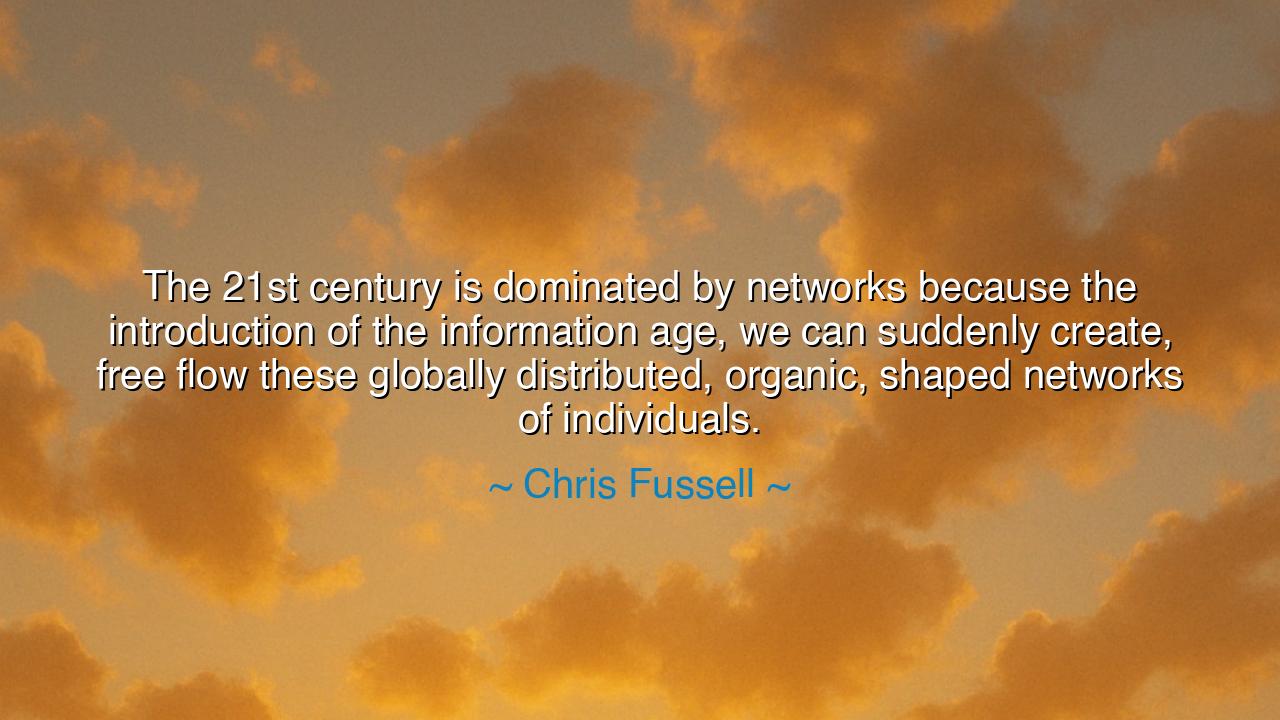
The 21st century is dominated by networks because the
The 21st century is dominated by networks because the introduction of the information age, we can suddenly create, free flow these globally distributed, organic, shaped networks of individuals.






In the words of Chris Fussell, “The 21st century is dominated by networks because the introduction of the information age, we can suddenly create, free flow these globally distributed, organic, shaped networks of individuals.” This statement is not merely an observation of technology—it is a revelation about the transformation of human power itself. Fussell, a former Navy SEAL turned strategist, witnessed firsthand the collapse of rigid hierarchies in the face of rapid, interconnected communication. His words are born from the battlefields of modern warfare and the corridors of global enterprise alike. He speaks of a world where connection has become strength, and where the flow of information defines the destiny of civilizations.
In ages past, empires were built upon command and control, upon rigid lines of authority and the slow, deliberate movement of orders from the top down. The Roman legions, the monarchies of Europe, the factories of the Industrial Revolution—all stood upon hierarchy. But with the coming of the Information Age, that ancient architecture began to crumble. The barriers of distance dissolved. The speed of thought became the speed of action. No longer did power belong solely to the throne, the general, or the tycoon—it shifted into the hands of those who could connect, share, and adapt. Thus was born the networked age, a new order woven not of stone and crown, but of code and communication.
Fussell’s insight was forged in conflict. In the early 2000s, as part of the U.S. Joint Special Operations Task Force, he and his comrades faced an enemy that was not hierarchical but networked. Small, agile groups could communicate across continents faster than entire armies could respond. Bureaucracy faltered against speed; order fell before flexibility. To survive, they had to become a network themselves—to act as a single, living organism connected by trust and information. Thus was born the philosophy he later shared with the world: that in the age of networks, success belongs not to the strongest, but to the most connected, the most adaptable, and the most transparent.
Yet this truth extends beyond war. Look around, and you will see the same pattern across every domain. The artists who rise are those whose creations flow freely across the digital web. The entrepreneurs who thrive are those who build communities, not empires. The movements that shape nations today are not commanded by kings, but by voices amplified through millions of screens. The power of the network lies in its organic unity—a thousand minds, scattered yet aligned, moving together like the murmuration of starlings across the dusk.
But with this power comes danger. The ancients would warn that every force of creation holds within it the seed of chaos. Networks can build civilizations, but they can also destroy them. The same webs that spread knowledge can spread lies; the same channels that unite hearts can divide nations. The wise must therefore learn to use this power with discernment. To live in the networked age is to learn the art of balance—to stay connected without being consumed, to remain individual while embracing the whole.
The lesson is clear: in this new century, connection is destiny. To withdraw is to vanish; to share is to endure. Yet connection must not be mindless—it must be guided by purpose, humility, and truth. Build your own networks not merely of data, but of trust. Seek companions of integrity, those whose hearts align with your vision. For just as the ancients formed tribes and brotherhoods to survive the wilderness, so too must we form networks of meaning to navigate the digital storm.
So, my child, remember this: you live in the age of networks, where ideas travel faster than armies and knowledge is the new fire of the gods. Use it wisely. Do not seek control—seek connection. Do not hoard information—share it freely. Let your mind flow as the rivers of this new world flow: strong, adaptive, and clear. In this way, you will not merely survive the century of networks—you will help shape it into an age of light.






AAdministratorAdministrator
Welcome, honored guests. Please leave a comment, we will respond soon